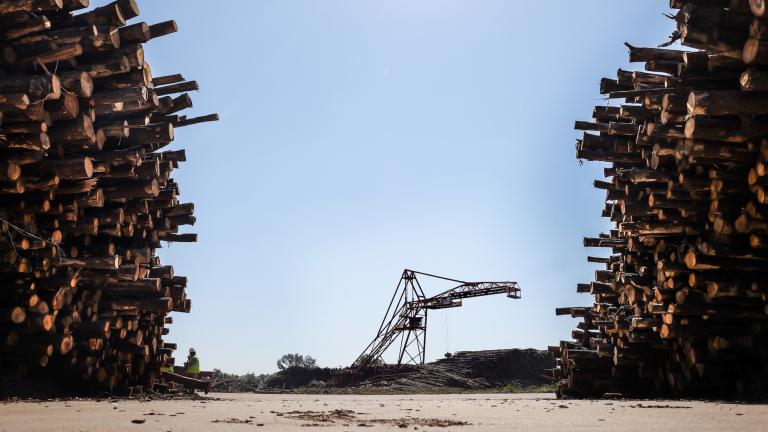 Tool of oppression–or liberation? In his recent essay on cooking, which I commented on here, Michael Pollan basically argues that people need to cook–that they give up more than they gain from fleeing the kitchen. And he suggests that the current generation is really the first to shun cooking. Yet things might not be quite so neat. Fresh Air recently replayed Terry Gross’ 1989 interview with Julia Child–very much worth a listen. Child reminds us yet again what a brilliant, funny, cultured lady she was–my dream aunt.
Tool of oppression–or liberation? In his recent essay on cooking, which I commented on here, Michael Pollan basically argues that people need to cook–that they give up more than they gain from fleeing the kitchen. And he suggests that the current generation is really the first to shun cooking. Yet things might not be quite so neat. Fresh Air recently replayed Terry Gross’ 1989 interview with Julia Child–very much worth a listen. Child reminds us yet again what a brilliant, funny, cultured lady she was–my dream aunt.
In the interview, we find out that Child herself didn’t grow up cooking. She says: “I grew up in the teens and ’20s, when most people had–middle class people–had maids or someone to help.” She reveals that her mother cooked seldom, and then only two dishes: Welsh rabbit (a kind of cheese sandwich) and baking-soda biscuits. As for herself, “I didn’t do any cooking then at all.”
I take two things from this. The first is that if Child could become a wizard in the kitchen without any exposure to it as a youngster, there’s hope for today’s crop of kids. (Of course, the young Child was eating food made from scratch–“sensible New England fare; roasts and things,” she she says–not processed junk.)
The second is this: the question of who cooks, and who doesn’t, has always been a vexing one. I suspect that through most of history, cooking was generally something to be avoided–an activity people strived to be able to pay (or force) someone else to do. And that history, no doubt, explains much of the appeal of fast food and convenience food. In Child’s time, “middle class people had maids or someone to help” cook; today, everyone does. Just walk into a McDonald’s with the equivalent of an hour’s minimum wage in your pocket, and you can eat like a king (at least in calorie terms).
This idea of cooking as a virtue–as something one should do, like exercising and tooth brushing–seems quite new. Not wrong–just new. And that means that by giving up cooking, we’re not becoming less human, as Pollan suggests, but succumbing to an all-too-human impulse.
Nevertheless, given population growth and the social, ecological, and public-health devastations of industrial agriculture, the mass flight from the kitchen doesn’t seem like an impulse we can indulge very much longer. Pollan was right: people do need to revalue the craft of cooking, to embrace it as a quotidian pleasure, not a mere chore. But if we manage convince them of that, we’ll have achieved something new, not returned to a lost past.
—————
Also on the topic of culinary nostalgia–the idea that everything was fine on the farm and at the table until the rise of the food industry–I’ve been reading Lawrence Goodwyn’s 1978 classic The Populist Moment: A Short History of the Agrarian Revolt in America. (I got hold of it as a gift of my friend and mentor Ken Meter.)
The book is worth reading for many reasons–not least of which is its ability to stamp out the idea of past agrarian bliss. In the following passage, Goodwyn could be describing the plight of today’s commercial farmers amid tightly consolidated livestock and grain markets. Instead, he’s describing the plight of farmers on the western frontier (today’s Midwest) in the 1870-1890 period … amid tightly consolidated livestock and grain markets.
Everywhere the farmer turned he seemed to be the victim of rules that somehow always worked to the advantage of biggest business and financial concerns that touched his world. To be efficient, the farmer had to have tools and livestock that cost him forbidding rates of interest. When he sold [his produce], he got the price offered by terminal grain elevator companies. To get his produce there, he paid high rates of freight. If he tried to tried to sell to different grain dealers, or elevator companies, or livestock commission agents, he often encountered the practical evidence of secret agreements between agricultural middlemen and trunk line railroad operators.
As bad as things were in the Midwest, Goodwyn informs us, they were worse in the in the territory they were fleeing from, the South.
As every passing year forced additional thousands of farmers into foreclosure and thence into the world of landless tenantry, the furnishing merchants came to acquire title to increasing portions of the Southern countryside. Furnishing men had so many farms, and so many tenants to work them, that it became psychologically convenient to depersonalize the language of agricultural production. Advancing merchants spoke to one another about “running 100 plows per year,” a crisp phrase that not only referred to thousands of acres of land, but also to hundreds of men, women, and children who lived in peonage.
By the end of the 1880s, Goodwyn writes, millions of farm families lived under such conditions, over a “1500-mile swath of the Southland, from Virginia to Texas.”
The book goes on to narrate the story of the populist movement–the alliance of farmers and urban workers to challenge the power of the trusts and the banks. I haven’t finished the book yet; something tells me the story doesn’t end well.
History offers many lessons–but few lost paradises. But the only way I know to maintain genuine hope while moving toward an uncertain future is to maintain a clear-eyed view of the past.




